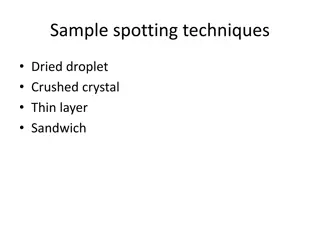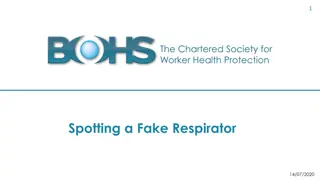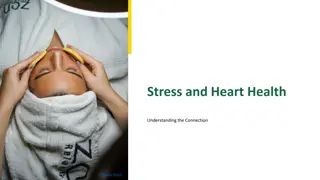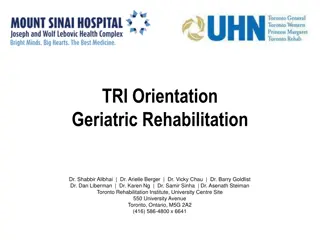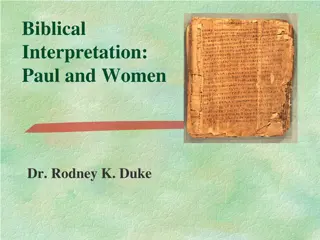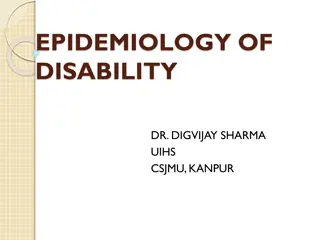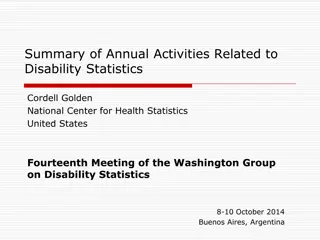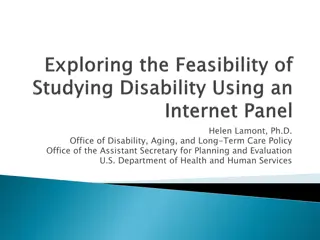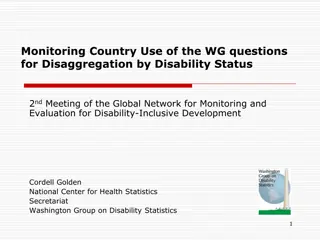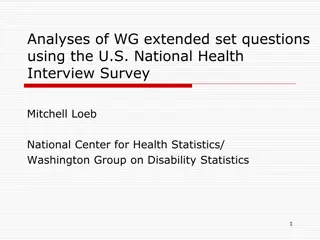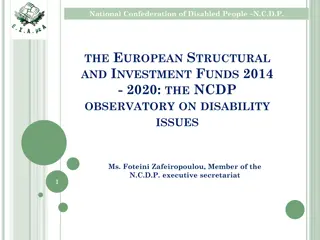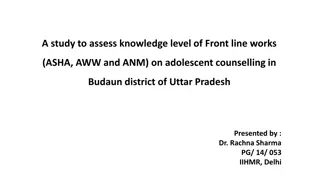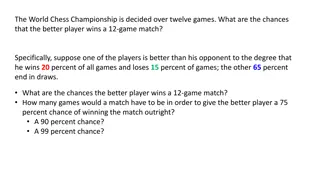Spotting Winning Disability Cases: A Guide from Asha Sharma and Paul McGrath
Spotting Winning Disability Cases guide provided by Asha Sharma and Paul McGrath from Disability Partners, PLLC in St. Paul, Minnesota. The guide covers case selection criteria, training staff to spot winning cases, and useful tips for representing clients in disability cases. The firm assists clients at various stages, including hearings and appeals, ensuring efficient screening and selection of meritorious cases. The guide emphasizes the importance of having a clear criteria for case selection to increase approval rates and avoid spending excessive time on cases that may not be approved.
Download Presentation

Please find below an Image/Link to download the presentation.
The content on the website is provided AS IS for your information and personal use only. It may not be sold, licensed, or shared on other websites without obtaining consent from the author.If you encounter any issues during the download, it is possible that the publisher has removed the file from their server.
You are allowed to download the files provided on this website for personal or commercial use, subject to the condition that they are used lawfully. All files are the property of their respective owners.
The content on the website is provided AS IS for your information and personal use only. It may not be sold, licensed, or shared on other websites without obtaining consent from the author.
E N D
Presentation Transcript
Spotting Winning Cases J. Asha Sharma, Paul McGrath Disability Partners, PLLC 2579 Hamline Ave. N., Suite C St. Paul, MN 55113 (651) 633-4882 asha@disabilitypartners.net paul@disabilitypartners.net
Law firm in St. Paul Represent clients all over Minnesota Asha attorney 30 years, 17 of those as a disability attorney Paul attorney 10 years, all of these as disability attorney Assist clients at all stages of the process. Including hearings, Appeals Council, and federal district court Introduction
Disclaimers These are guidelines for how we select cases for our firm. We re a small firm, and we re not a nonprofit agency. We need criteria to enable efficient screening. There is no one-size fits all. Nonprofit agencies can take on more weaker cases. Our criteria is not just taking all A+ cases we do take many cases where a win is not certain. We do take cases involving DAA history, but not active DAA. Our philosophy is to take cases where we feel we have a fighting chance to win the case for the client. We break our rules all the time these are just guidelines.
Why have case selection criteria Lower approval rates means you spend more time on cases that won t be approved. Even meritorious cases with good evidence will be denied. This is why we re taking more cases to federal court. Approval rates are low because of well known fraud cases. Eric Conn (colluded with ALJ, psychologist, and Dr. to defraud SSA) Critical to train staff on spotting winning cases. Otherwise spend hours trying to figure out whether to take a case. Disclaimer: these are criteria that have worked for us you might have different criteria that work for you.
Training Staff Train all staff to spot winning cases. Use a screening tool to interview prospects about basics, e.g., financial eligibility criteria. If basics are met, staff evaluate merits of disability claim. See one-page resource cheat sheet. Encourage staff to use their judgment in selecting cases. Regular meetings to go over interesting or complex fact patterns and prospects. Feedback in meetings about cases won or lost and why. At hearing level: obtain file from OHO for attorney review.
Training Staff, cont. Ask follow up questions to determine merits of case: Documentation, e.g., IEP, diagnostic, discharge summaries. History of special education. Nonconservative treatments. Supports and services. Certified disabled for Medicaid, VA, or LTD. Under legal guardianship. Using walker, cane, etc. Ask why couldn t do a simple, sit-down job. Follow up with case worker or family member for more information about functioning.
Devising Case Selection Criteria Necessary to have case selection criteria to guide staff. Improve your chances of selecting winning cases. Important to balance clear, simple rules with flexible guidelines. Our criteria give guidance on when to Take, Don t Take, and Use Caution, along with factors to weigh when unsure whether to take a case. See Cheat Sheet.
Dont Take! Represented by another attorney or rep (unless client has a good reason). Significant and active DAA. unless 50+, serious physical issue, or schizophrenia w/ hospitalizations. Under age 50, only mental illness and minimal treatment (unless low IQ or schizophrenia w/ hospitalizations). Under age 5, unless has a serious developmental issue. Or if you re representing NICU babies. Currently incarcerated (unless about to be released). Overpayment cases (unless client gives you a retainer). Age 62+, getting early retirement Age 65 and SSI only Makes threats against attorneys, reps, or staff.
USE CAUTION Recent onset injury or condition (12-month duration issue). Non-citizens. Not eligible for SSI unless refugees, or other exception. Chronic pain, fibromyalgia, migraines unless sobriety and full treatment compliance. Stroke, seizure, migraines, obesity, autism, borderline IQ might be difficult to win. Important to ask additional questions before taking the case. Approval can depend on duration, med compliance, severity of impairment, other impairments. SSDI only and remote DLI (more than 3 years) Age 61+ If planning on early retirement can result in very little back pay. Termination cases with conditions expected to improve, e.g., depression. Child cases are difficult to win responsive parent is a must. Compelling trauma history but no treatment. Extremely difficult individual, combative, demanding.
Over age 50, serious physical condition, no red flags. Wheelchair, walker, 2 crutches, 2 canes. Nonconservative physical Tx, e.g., dialysis, transplant, oxygen tank Multiple serious surgeries, hospitalizations. Compassionate allowance cases. Terminal illness. Benefit of doubt cases: good work history + serious physical or mental condition, no DAA or other red flags + work stopped because of disability onset. Clearly meets certain Listings criteria more on this later. TAKE! Physical Conditions
No DAA, regular treatment, and one or more of these: Frequent hospitalizations Partial hospitalization or day treatment Non-conservative treatment, e.g., ECT, TMS, Ketamine Residential treatment stay (not related to DAA) Extensive support services (ARMHS, ILS, case management) Meets Listing criteria more on this later . Take! Mental Conditions
Factors Weighing in Favor of Case Age 50+ Good work history No current work or less than 15 hours/week No active DAA Frequent, regular treatment Multiple weekly medical or psych appointments Nonconservative treatments (hospitalizations, surgeries, etc) Supportive services or living arrangement Commitments, residential treatment (esp. if no DAA)
Factors Weighing in Favor of Case contd Stop work date and AOD are consistent. Unsuccessful work attempts. Vocational assessment says unable to work. IQ less than 75. Illiterate or minimal education. Previously on disability. Referred by medical professional or reliable referral source. Reliable referral source says prospect unable to work at all. Good communication, returns phone calls. Convincing story (after screening, you re persuaded that prospect can t work).
Under age 50. Poor work history. Working more than 15 hours per week. Factors Weighing Against Case Significant DAA history and sober less than a year. Lack of treatment or minimal treatment. Noncompliance with prescribed treatment. Only conservative treatment. Only followed by primary doctor.
Factors Weighing Against Case, contd Living independently with no assistance or supports. Stop work date and AOD are not consistent. Felony history. Attending school (unless significant accommodations). History of referral source sending marginal cases. Not returning calls, difficult to reach. Disability story unconvincing, or, after screening, you feel that prospect could work FT.
Your case selection criteria will evolve over time. Review and revise your criteria periodically. Review for impact of unconscious bias on selecting cases. Pay attention to trends in Social Security, DDS, hearing office. Additional Thoughts
Well interview claimant symptoms and functioning. We ll request Social Security file from the hearing office. If we take the case, we ll typically obtain opinion forms from providers. We may ask claimant to get additional testing or evaluation, e.g., EMG testing, psychological evaluation, or MRI. We write briefs summarizing the medical evidence and why claimant meets disability criteria. We ll represent claimant at the hearing and cross-examine witnesses. If needed, may take case to Appeals Council and federal court. Contact us for help with cases at hearing
J. Asha Sharma, Paul McGrath Attorneys Disability Partners, PLLC www.DisabilityPartners.net asha@disabilitypartners.net paul@disabilitypartners.net (651) 633-4882 Contact Information
PHYSICAL LISTINGS Musculoskeletal Need for walker, wheelchair, 2 crutches, 2 canes. Unable to use or serious problems with both hands. Amputation but unable to use prosthesis. Special senses Both eyes affected + very limited vision in the BETTER of the two eyes, even with glasses. Profoundly deaf, 90 decibel hearing threshold. Unable to speak and be understood.
PHYSICAL LISTINGS Respiratory Using an oxygen tank. 3 hospitalizations in 12 months. Very abnormal spirometry readings (40% predicted or less). Cardiovascular Ejection fraction < 30% and significant problems with exertion. Kidney 3 hospitalizations in 12 months. Needs dialysis or transplant.
PHYSICAL LISTINGS Skin Skin lesions on critical body areas for more than 3 months (armpits, anal, groin). Digestive Repeated hemorrhaging, requiring blood transfusions. BMI 17.5 or less or more than 10% weight loss. Requires feeding tubes or colostomy bag. Diabetes w/ serious complications (e.g., vision, neuropathy, repeated hospitalizations). Usually Type 1.
PHYSICAL LISTINGS Neurological Weekly or biweekly seizures, full med compliance, and no DAA. Stroke, brain tumor, Parkinson s cerebral palsy, multiple sclerosis, peripheral neuropathy, TBI causing: Serious limitations in physical and mental functioning. Immune system Fatigue, fever, or weight loss + serious physical + serious mental limitations.
MENTAL LISTINGS Serious limitations in two or more mental domains Look for indicators of marked impairment: Involuntary commitments. Repeated serious mental health crises (e.g., suicide attempt)/hospitalizations. Under legal guardianship. Long term non-conservative treatment . Reliance on others, especially professionals, to complete many daily activities. Living in assisted living. IQ cases: Look for valid IQ score of Less than 60 or 60-70 and serious limitations in two or more domains.
Contact Information J. Asha Sharma, Paul McGrath Attorneys Disability Partners, PLLC www.DisabilityPartners.net asha@disabilitypartners.net paul@disabilitypartners.net (651) 633-4882



